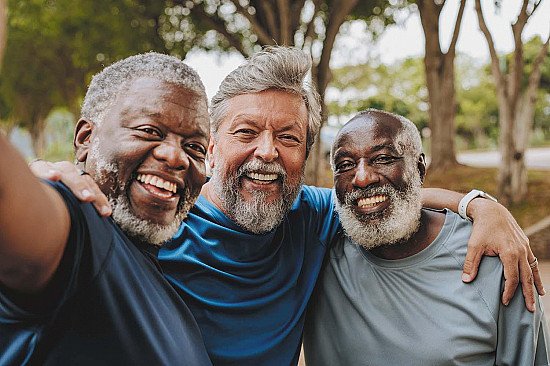[ad_1]

Happy people tend to be healthier. Sunny conditions lower blood pressure and the stress response, improve the immune system and can motivate people to be more active.
Research suggests that on average, genetics determine 50% of a person’s overall disposition. Some people are naturally happy. But for the rest, happiness is within their control, according to Dr. Robert Waldinger, director of the longest-running study on happiness, the Harvard Study of Adult Development. “Even if you don’t consider yourself a happy person, chances are you have the power to change that. What’s important is to regularly practice acts of happiness, activities related to improved mood and optimism.” Here are some examples you can try.
Stay connected. Scientists have discovered a strong link between happiness and close relationships with family and friends. “Personal connection creates emotional stimulation, which automatically boosts mood, while isolation destroys mood,” says Dr. Waldinger. Make an effort to expand your social circle: set a lunch date with a friend, schedule a Zoom call, or join a sports league or civic club.
Raise your hand. Studies have shown that volunteering provides a feeling of purpose, which can improve your mood. The effect is particularly strong in older people. Find volunteer opportunities in your area that match your interests with the VolunteerMatch network.
Find your inner child. Revisit activities that brought you joy as a child or young adult. What made you happy then? Return to the hobbies, games, sports, or other interests of your youth.
Invest in experiences. In a way, money can buy happiness if you use it to buy interesting and stimulating life experiences. It doesn’t have to be an expensive adventure. For example, opt for dinner at an ethnic restaurant, a morning at the theater or a visit to an art exhibition. The investment can also have a lasting impact, as experiences create pleasant memories that you can reflect on when you need a mood boost.
See green. Many studies have shown that happiness is linked to time spent in urban green spaces like parks, gardens and river banks. Any type of interaction with the outdoors can have the same effect, such as hiking a trail, walking on the beach, or exploring the nearby woods.
Break your routines. People feel happier when their daily routines have variety. Even small changes can have a significant impact. One study found that changing your usual habits — like trying a new exercise routine every two weeks or taking a different route to the grocery store — can improve your outlook.
Embrace gratitude. Look around you and be grateful for what you have instead of looking for something new, hoping it will make you happier. A 2021 study found that practicing gratitude for 15 minutes a day can improve emotional well-being. There are a multitude of ways to practice gratitude. Write a letter or email to someone expressing your appreciation for their presence in your life. Start a journal in which you list things you are grateful for, such as a compliment from a stranger, nice weather, or a delicious meal. Reflecting on your good fortune through prayer or meditation can also help.
Smile more. Research has shown that smiling can improve your mood, just as a scowl can make you angrier and frowning can make you sad.
Another secret to happiness? Let goMost adults seem to feel happier with their lives as they age, even though they may face problems such as health problems. Their possible secret? They don’t worry about the little things as much as they did when they were younger. Studies have shown that older people are better able to let go of toxic relationships and past failures. “As people get older, they tend to focus more on what is most important to them,” says Dr. Robert Waldinger, director of the Harvard Study of Adult Development. “They realize how short life is and pay more attention to what makes them happy.” |
Image: © andreswd/Getty Images
[ad_2]
Source link
